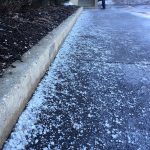New Chloride Regulations on Private Industrial Facilities
Recent moves by the IEPA in regard to the ILR00 General Storm Water Permit for Industrial Activities suggest that the agency will be increasing the use of its NPDES permit authority to implement storm water controls for pollutants with TMDLs or 303 (d) listings. The ILR00 Permit covers storm water runoff from many industrial facilities where materials and equipment may be exposed to storm water. The 2017 permit requires that the site operator document in their Storm Water Pollution Prevention Plan (SWPPP) if the stream to which they discharge storm water is listed on the 303(d) list of impaired waters or has an approved TMDL. If a facility is releasing a TMDL or a 303(d) pollutant in its storm water than the facility must take additional steps to address the impairments.
For receiving streams with an approved TMDL for chloride, the ILR00 requires all holders of the permit to evaluate and implement ways to reduce chloride (salt) runoff from their facilities. These requirements could affect as many as 35 private industrial facilities within the DRSCW watersheds. Other public entities such as Publicly Owned Treatment Works may also be subject to these requirements. How the chloride reductions are made would vary depending on if the facilities hire a contractor or self-perform snow and ice removal.
- If hiring a contractor, the contract should reflect the practices and documentation necessary (visit https://www.drscw.org/sidewalks-and-parking-lots/ for a model contract). The contractor could also be required to attend one of the sensible salting workshops in the region.
- If self-performing, a winter facility plan should be developed setting service levels for the complex. Application rates should be reviewed (see link above). All salt storage of materials should be covered with an impervious cover and kept away from storm drains or areas of surface flow. All practices should be documented. Staff may be required to attend a sensible salting workshop.
- Monitoring for chlorides at the facilities outfall may be also required.
For industrial facilities that discharge to an impaired water where there is not an approved TMDL, the ILR00 requires these facilities to monitor chlorides at each outfall a minimum of one time per year.




